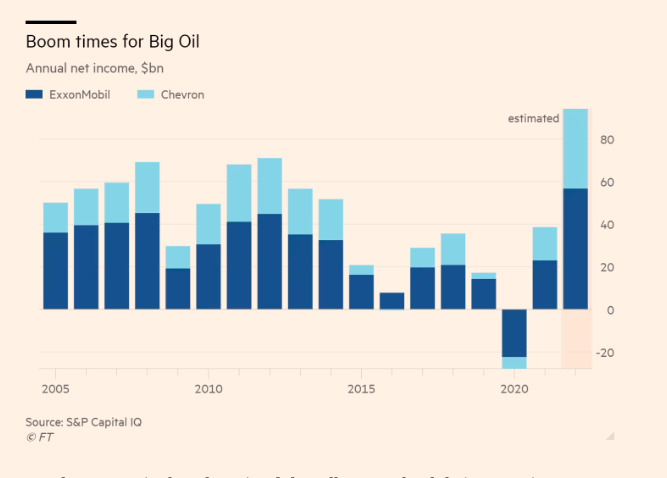The global capitalist system is failing society in just about every way imaginable. We have to hope decline is laying the foundations for a great leap forward.
Ben Wray is co-ordinator of Brave New Europe's Gig Economy Project and co-author of Scotland after Britain: The two souls of Scottish independence.

In a profound sense, the world is going through a period of regression, where no one can plausibly claim any longer that global capitalism is a motor of societal progress.
The ILO finds that global real wages declined by minus 2.2 per cent in the first half of 2022, the first time that has happened this century. Inequality is rising in every region of the world, to the point that it is now as wide as the peak years of colonialism in the late 19th century. In the US – still the beating heart of the global capitalist economy – life expectancy is in decline for the first time since the 1920s.
Meanwhile, global carbon emissions continue to rise to new heights, as the world system shows itself to be totally incapable of reducing its dependency on fossil fuels. At current trends, it will take just nine years to smash through the 1.5 °C limit in global temperatures to prevent the worst of climate breakdown.
Politically, there are few expectations that governments will do anything other than continue to reinforce these trends.
The response to rising inflation, which has been driven by supply-side factors like rising wholesale energy prices and supply chain problems, has been to crush the working class through sharp increases in interest rates and falling public spending, while allowing energy giants to reap the rewards of rising prices. This has led to a profits bonanza for banks and energy companies, with one study finding corporate profitability is responsible for almost 60% of inflation. The inflation crisis has been used as cover for an unprecedented increase in the rate of exploitation of workers by capital.
The war in Ukraine has been a boon for fossil capital in particular, as governments in Europe have responded by buying up gas from the US and the Middle East at ultra-high prices while renewing commitments to fossil fuel projects at home. In Germany, where the Green Party is part of the coalition government, at least 20 coal-fired power plants are being reactivated or their run times extended, a year after Europe made a song and dance about its commitment to rapidly phase out coal at COP26. At this year’s COP, in Egypt, no one even expected meaningful progress on reducing emissions.

Even the official opposition goes along with the thrust of these policies, a ‘there is no alternative’ consensus that means that only one class, the capitalist class, is ever represented politically. In the UK, Labour’s shadow Health Secretary Wes Streeting attacks health unions and promises to continue the privatisation of the NHS if Labour come to power, mimicking the Tory Government. Labour politicians who support strikes are sacked. European social democracy has become so hollowed out, so debased from any sense of a working class interest, that its representatives move seamlessly across the political spectrum in response to events. Opportunism rules the roost.
All the while, new fires break out in what economic historian Adam Tooze has called “the polycrisis”. The intersecting forces of ecological, financial, geopolitical and social instability induce extreme events – whether it be a global pandemic, a heatwave, a cost-of-living-crisis, sovereign debt crises, war – which fold into and exacerbate one another, enhancing the sense of a generalised turmoil, and strengthening the forces which are most capable of emergency response (states and the capitalist elites they protect) at the expense of democratic impulses. If this is our new normal, there are few signs that it will produce anything other than increasingly authoritarian rule as a corporate-state nexus dominates digital communication flows and an increasingly individualistic citizenry looks to the culture war battles of super-rich celebrity goodies versus baddies, rather than mass political action from below, as the agent of change.
Alienation is breeding a mental health epidemic, with nearly one billion people worldwide now thought to be living with a mental disorder, 1 in 8. Despite the lifting of lockdowns in Europe, latest figures show the number of people in the EU reporting ‘bad’ or ‘very bad’ mental health continues to increase, from 7.9% in March 2021 to 12.7% in March 2022. The structure of modern social life is one that induces poor mental health through disconnection from ourselves and one another. While technological and economic changes are important to understand contemporary developments in alienation, these are undergirded by an ideological paradigm where religion is in decline almost everywhere while active political projects aspiring at universal social progress – whether capitalist, communist or anything else – continue to be in retreat. A sense of “existential confusion” is pervasive, and as sure a sign of regression as anything else.
But history is a dynamic process, where decline can be the basis for a rapid advance that would not have been possible if history were simply a gradual process of decline and/or progress. As the late Daniel Bensaïd wrote just over 20 years ago: “’Breaks in gradualness,’ noted Lenin at the beginning of the war in the margins of Hegel’s Science of Logic. And he stressed: ‘Gradualness explains nothing without leaps. Leaps! Leaps! Leaps!’”
While pessimism is realistic given the circumstances, we have to retain optimism that a great leap forward might be closer at hand than a rational analysis may be willing to permit. And our optimism must not be passive, it must be politically committed and strategic, seeking out – in Bensaïd’s words – the “favourable moments and weak links” which can help induce such a leap. If history can teach us one sure thing about the future, it is to expect – and prepare for – the unexpected.


Be the first to comment